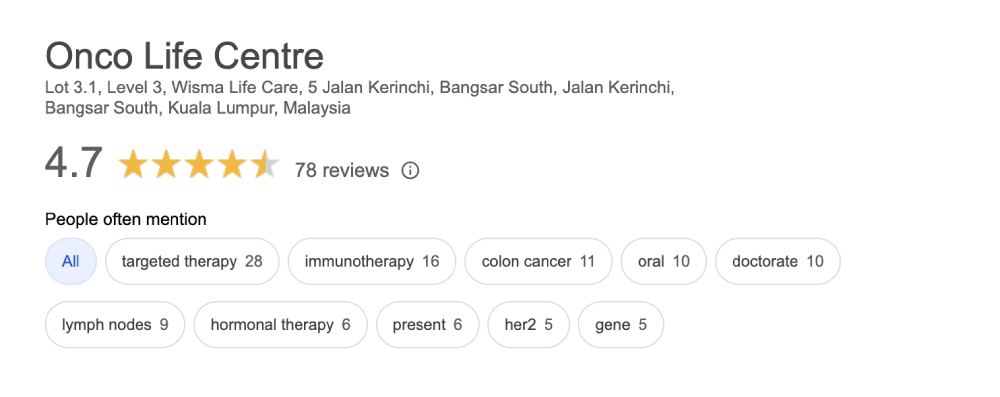

Cholangiocarcinoma is cancer of the bile duct.
Extrahepatic cholangiocarcinoma originates from the part of the bile duct that is located outside of the liver and tends to be the most treatable form of the disease.
Hilar cholangiocarcinoma originates from where the right and left hepatic ducts join and is also called a Klatskin’s tumor.
Intrahepatic cholangiocarcinoma makes up about 5% to 10% of bile duct cancers and are located inside the liver.




Treatment recommendations for cholangiocarcinoma by our cancer specialists at Onco Life Centre are tailored, personalized and depends on tumor stage, tumor genomics (IDH1, FGFR2, KRAS, NRAS, KRAS G12C HER2, PDL1, TMB, MSI, NTRK1-3 fusion, BRAF, BRCA1, BRCA2, PALB2 gene mutation status), pre-existing medical conditions, your overall health and nutritional status.
Targeted therapy and immunotherapy is the foundation of precision medicine. Our best cholangiocarcinoma Oncologists at Onco Life Centre work in close collaboration with Cancer Genomics Experts in the US to perform cancer gene mapping and DNA sequencing on our patients’ cancer tissue. Regular teleconferencing and live exchange of information with the US Genomics Experts allows our Oncologists to specifically design unique treatment plans for our patients. By targeting specific genes and proteins that are involved in driving cancer survival and progression, our patients at Onco Life Centre are experiencing significant and sustained improvements in their cancer responses and living longer.
At Onco Life Centre, we have made it our mission to improve the everyday lives of our patients. Our Oncologists and Pharmacists will seek to identify Compassionate Drug Access Programs that allows pre-approved new drugs outside clinical trials (and prior to product launch) for our patients who do not have satisfactory therapy options available.
This is a treatment option if the tumor has not spread beyond the bile duct.
If the cancer is near the liver, the surgeon will remove part of the liver.
This type of extensive surgery is recommended if the cancer is near the pancreas. The surgeon removes part or all of the pancreas and part of the small intestine, bile duct and stomach. The surgeon then reconnects the digestive tract and biliary system.
The surgeon completely removes the liver and bile ducts. The surgeon then transplants a donor liver. However, bile duct cancer tends to recur very quickly after transplantation.
Targeted therapy is a treatment that targets the cancer’s specific genes, proteins or the tissue environment that contributes to cancer growth and survival. This type of treatment blocks the growth and spread of cancer cells while limiting damage to healthy cells. To match your cancer disease with the most effective treatment, our oncologist at Onco Life Centre may run tests to identify the genes, proteins, and other factors in your tumor. Read More ...
Immunotherapy is designed to boost the body's natural defenses to fight the cancer. In 2022, the FDA approved an immune checkpoint inhibitor combined with chemotherapy for locally advanced or metastatic cholangiocarcinoma. An immune checkpoint is a protein that can stop the body’s immune system from responding to cancer cells. By blocking the immune checkpoint PD-1, it allows the immune system to find and attack cancer cells. Read More ...
Chemotherapy is the use of drugs to destroy cancer cells, usually by stopping the cancer cells’ ability to grow and divide. Read More ...
If cancer spreads to another part in the body from where it started, doctors call it metastatic cancer. Your treatment plan may include a combination of the treatments discussed above. Talk to our oncologists about your first and second line treatment options, which can heavily depend on your overall health and preferences. Read More ...
Onco Life Centre combines key elements of cholangiocarcinoma cancer care and cholangiocarcinoma cancer treatment under one roof, with convenience and speed. At Onco Life Centre, we have the necessary medical disciplines to achieve this. Our board certified highly experienced consultant oncologists have earned recognition for excellence in the field of cholangiocarcinoma cancer treatment, providing our patients with the most advanced cholangiocarcinoma treatment options.

Dr. Christina Ng is a Consultant Medical Oncologist and Founder President of Empowered, The Cancer Advocacy Society of Malaysia.…
Treatment cost for cholangiocarcinoma cancer depends on several factors, such as the type and stage of the cholangiocarcinoma. Generally, using only chemotherapy is cheaper compared to using targeted therapy or immunotherapy. At Onco Life Centre, the cost for treating cholangiocarcinoma using chemotherapy for most of our patients is MYR1,500 onwards. Average cost of immunotherapy for cholangiocarcinoma cancer can range from MYR10,000 depending on the specific type and dosage of immunotherapy drug used.
Patients and their families have opportunities to talk about the way they are feeling with our oncologists, nurses, counselors, or join our psychosocial program and support group at Onco Life Centre.

